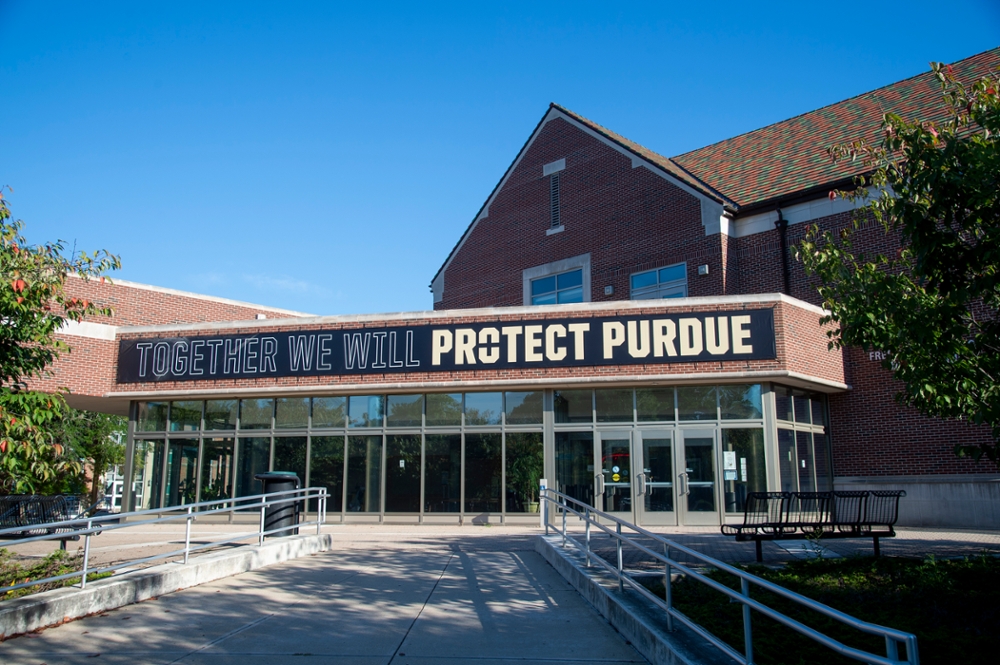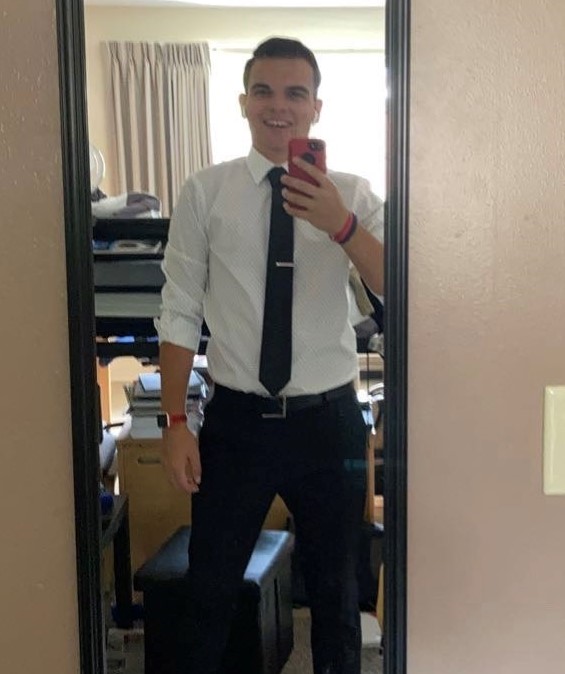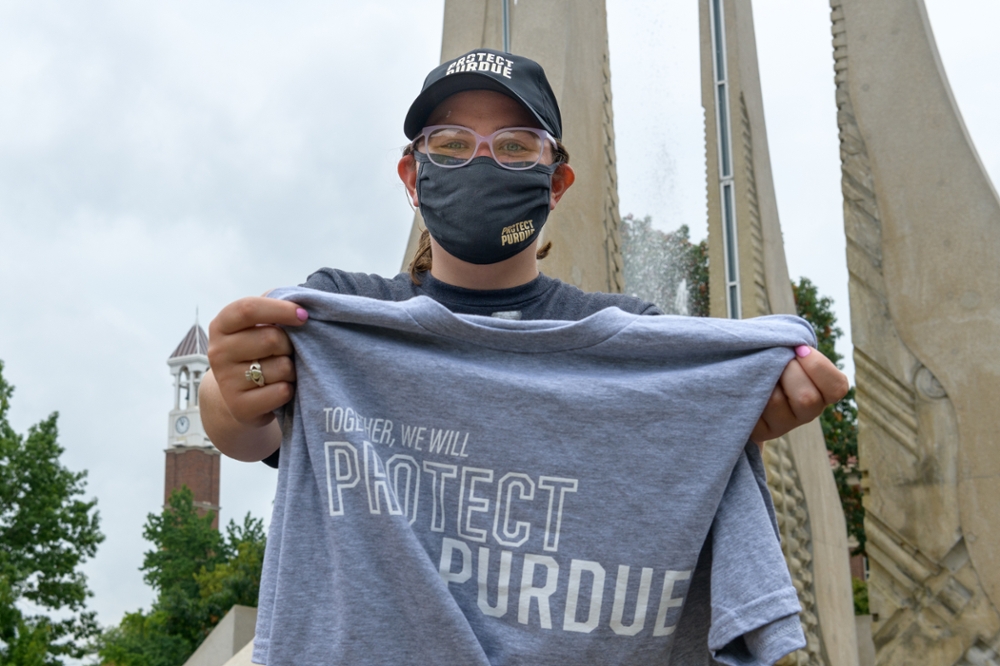
Academic Case Manager program continues to support Purdue students in quarantine, isolation
Last updated: Feb. 5, 2021
The chain of events that led to Purdue sophomore Michael DeHaven needing to quarantine began with a "popping" sound and some slight pain in his right ear.
DeHaven, who is studying to become a nurse, contacted the Purdue University Student Health Center (PUSH) in mid-September because he suspected he had an ear infection. PUSH staff instructed DeHaven to notify the Protect Purdue Health Center (PPHC) of his symptoms, which he did. PPHC staff then instructed DeHaven to be tested for COVID-19 and not to leave his room, except to visit PUSH.

Purdue sophomore Michael DeHaven snaps a mirror selfie to commemorate his release from quarantine before leaving his room for an interview.
This was stressful news to DeHaven because he would have to miss his first clinical rotation, a major milestone in a nursing student’s academic journey, which was scheduled to take place the next day. As instructed, DeHaven quarantined in his room until receiving a negative COVID-19 test two days later.
It wasn't ideal, he said, but one thing that helped was connecting with Allison Staley, financial aid administrator in Student Success Programs, who served as DeHaven’s Academic Case Manager (ACM) while he was in quarantine. DeHaven said he was grateful to Staley because she helped him navigate the timelines and requirements of unfamiliar processes. But even more importantly, "she was someone who could listen and offer guidance and advice during a time when I was struggling quite a bit," he said.
About Purdue’s ACM initiative
According to Jenna Rickus, professor and vice provost for Teaching and Learning, the idea to connect students in quarantine or isolation with an Academic Case Manager developed during conversations between Purdue faculty and administrators in June 2020 as Purdue was preparing to deliver a fall 2020 residential campus experience amid the evolving coronavirus pandemic.
Under the Protect Purdue guidelines, administrators recognized that some students would need to spend days, even weeks, outside the physical classroom. There were concerns that students would feel pressure to attend class, even if it meant breaking quarantine policies.
"Much of the Protect Purdue plan, with respect to teaching and learning, is focused on both public health and safety and academic continuity and success – keeping people safe while allowing teaching and learning to continue," Rickus said. "As we contemplated what life would be like for a student who needed to quarantine or isolate during the semester, it quickly became obvious that a student would need a clear point of contact to help them navigate both the medical and academic aspects of their situation. Not long after medical case managers were created in the Protect Purdue Health Center, we decided that we needed to commit an academic case manager to students as well."
Now in its second semester, the program has had some noteworthy wins. According to Dennis Bowling, senior associate director of Student Success Programs, students who engaged with an ACM in the Fall 2020 semester were more likely to have earned 15 or more credit hours than quarantined students who either declined to work with an ACM or were not assigned an ACM.
Additionally, the average Fall 2020 GPA for students who engaged with an ACM was 3.25, higher than the average GPA for students in quarantine who were not assigned an ACM or who never responded to the ACM's outreach.
Based on these findings, Purdue now automatically assigns ACMs to all congregate living students, instead of framing the ACM role as an optional resource.

A Purdue construction crew hangs new 'Protect Purdue' sign featuring a Purdue Vet Medicine student.
Bowling, who co-leads the ACM project with academic advisor Maggie Smith, also served as the group's first ACM for summer students in quarantine. He said the ACM mission is unchanged, despite minor program adjustments from fall to spring.
ACMs aim to provide proactive outreach and advice to help students in isolation and quarantine be better equipped to stay active in class while staying safe in their environment. Thus, the role of the Academic Case Manager was partly inspired by existing student support initiatives, such as those offered by Student Success Coaches in Purdue Promise or Peer Success Coaches in the Academic Success Center. Housed within Purdue Student Success Programs, such support resources provide opportunities for one-on-one support, offering a dedicated and reliable human who can answer students’ questions and connect them with other resources based on their needs.
The initiative also took notes from Purdue's existing student-of-concern process, as well hiring and training processes used to staff the University’s Protect Purdue call center. The plan was to use similar models to train ACMs, who take on the role in addition to their regular responsibilities.

Protect Purdue ambassadors hand out t-shirts to students on campus
Courtney Wilson, a Purdue Promise student success coach, was one of the first five staff members who signed on to serve as an ACM.
"I like to help; I’m a helper," said Wilson, who had an average caseload of about 20-25 students in quarantine or isolation at a given time, in addition to her regular caseload of Purdue Promise students. "The goal was to make sure students in quarantine or isolation had whatever resources they needed, that they were aware of how the process works, and that they didn't have to figure all of this out on their own. Just listening sometimes is enough."
For every Purdue student who tests positive for COVID-19, roughly two or three of that person’s close contacts may need to quarantine. To-date, more than 5,800 Purdue students have been assigned an Academic Case Manager, with more than half of those students still actively working with their ACM as of the end of January, 2021.
And although their routines have been altered significantly, students are still finding creative ways to persevere. One quarantined student, for example, had to miss her biomedical laboratory class, so her lab coordinator assembled a lab kit that was delivered to the student’s sorority house the same evening. Another student auditioned for orchestra over Zoom.
But the hardest part of quarantine wasn't the schoolwork, said student Michael DeHaven. The most frustrating part, he said, was not knowing what to expect, and the loneliness.
"The quarantine process was completely new to me," DeHaven said. "I was sitting there thinking, ‘What do I do now?’ And then I got this email from my Academic Case Manager, Allison, basically saying, ‘Hey, I’m here to help you. I’d like to set up a time to speak with you.’ And she reassured me and made me feel a lot better about the situation."

Protect Purdue signage covers the ground outside Mackey Arena.
Writer: Andrea Mattingly, Student Success Programs, andrea@purdue.edu
Contacts: Dennis Bowling, Senior Associate Director for Student Success Programs, bowlingd@purdue.edu
Michael DeHaven, Sophomore in Purdue's School of Nursing, dehavenm@purdue.edu
Jenna Rickus, Professor and Vice Provost for Teaching and Learning, rickus@purdue.edu
Maggie Smith, academic advisor in Purdue's College of Pharmacy, smithmj@purdue.edu
Allison Staley, Financial Aid Administrator for Student Success Programs, astaley@purdue.edu
- Last call to participate in Purdue’s inaugural first-generation student symposium on Jan. 30
- Supporting Veteran Students During Ukraine-Russia Crisis
- Campus partnership will bring student- and instructor-created interactive installations to Boiler Gold Rush
- Student Success staff build intercultural competence through Intercultural Development Inventory (IDI) training
- Staff and faculty invited to Green Zone summer sessions to help further support military-affiliated Purdue students
- More than 8,000 new Purdue students will participate in on-campus orientation programs
- Student Success Programs Director Profiles
- Purdue Teaching and Learning staff share research-based tips to promote student engagement
- More than 500 Purdue students opt in to ‘test drive’ Elliott Hall mock exam experience
- Staff, faculty invited to attend candidate presentations for next director of Purdue Promise
- Meet Morgan Torres, Director of Veterans Success Center (VSC)
- Meet Keara Wilson, Director of Span Plan Nontraditional Student Services
- Meet Brittany Allensworth, Director of Horizons
- Purdue renames Academic Success Center to honor founder, first African American faculty member
- Veterans Day salute to take place at Union
- Meet Jazmine Clifton, director of Purdue Promise
- Student Success Programs boost access to study abroad experiences
- Purdue staff member invited to serve on Indiana Veterans Affairs Commission
- Breaking Barriers: Brittany Mills' story of persistence and greatness in the field of biomechanics
- Over the weekend, campus will celebrate Horizons Student Support Services and the difference TRIO programs make at Purdue
- Purdue Horizons director selected by Indiana TRIO for Emerging Leaders Institute 2022 cohort
- Purdue changes academic regulations language to ‘academic notice’
- Purdue community invited to honor the fallen during Memorial Day observance
- New collaboration between Purdue University and United States Space Force will introduce high school students to careers in aviation and space
- Campus departments invited to host open houses during Boiler Gold Rush
- Purdue Testing Services
- Fleischer Scholars 2023 Inaugural Session
- A new kind of teaching assistant
- Grant proposals for experiential education programs due Oct. 13
- Academic Success Center offers Test Drive in Elliott Hall
- Purdue community invited to Nov. 10 space dedication and renaming ceremony for the Dorothy Stratton Veteran and Military Success Center
- Purdue celebrates first-generation college students during national First-Gen Week
- Purdue honors ‘trailblazer’ Dorothy Stratton during Veteran and Military Success Center renaming and dedication

